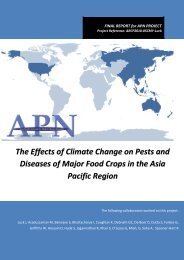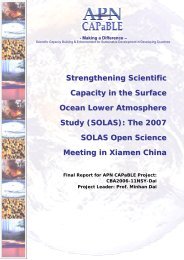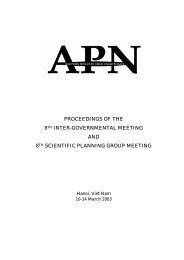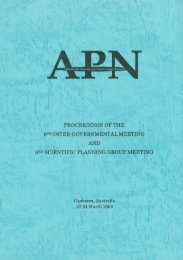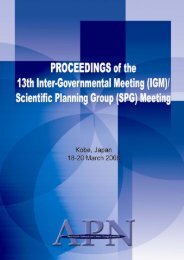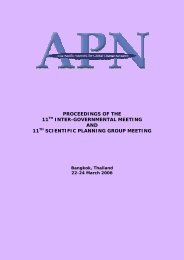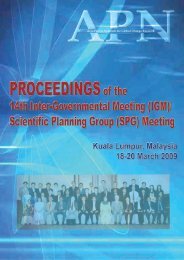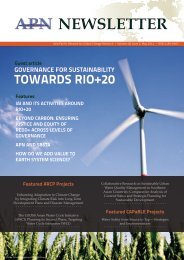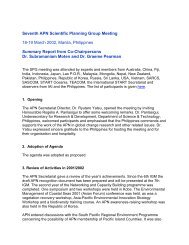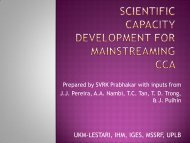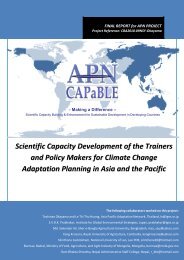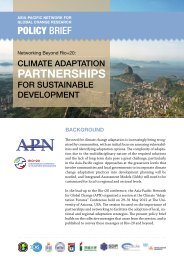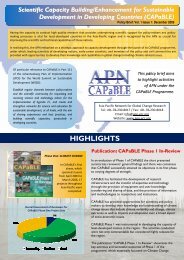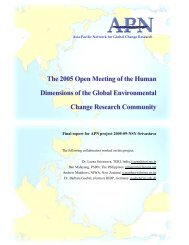2005-IGM-SPG 10.pdf - Asia-Pacific Network for Global Change ...
2005-IGM-SPG 10.pdf - Asia-Pacific Network for Global Change ...
2005-IGM-SPG 10.pdf - Asia-Pacific Network for Global Change ...
You also want an ePaper? Increase the reach of your titles
YUMPU automatically turns print PDFs into web optimized ePapers that Google loves.
<strong>IGM</strong>/10/10<br />
<strong>SPG</strong>/10/10<br />
broad thematic areas matching the programmatic approach to sustainable<br />
development activities, gaining prominence in the <strong>Pacific</strong> region.<br />
14-16 April 2004. Preparatory Meeting <strong>for</strong> the Ten-Year Review of the<br />
Barbados Programme of Action (BPOA+10). United Nations Headquarters,<br />
New York, USA<br />
Director of the START, Oceania Secretariat, Prof. Kanayathu Koshy was among the<br />
delegation which participated in this meeting. Prof. Koshy gave a presentation on<br />
‘Capacity Building <strong>for</strong> Sustainable Development’ in one of the side events. <strong>Pacific</strong><br />
SIDS emphasised that causes beyond their direct control impede full and effective<br />
implementation of the BPOA. These included: overall decline in overseas<br />
development assistance, decline in commodity prices, loss of preferential trade<br />
arrangements, global pressure to reduce the size of the public sector, increase in the<br />
cost of imported fossil fuels and, instigation of some donor driven projects that may<br />
be inconsistent with the BPOA. On top of this, there was deep concern with regards<br />
to the impacts of climate change, climate variability, sea-level rise and extreme<br />
weather events as an impediment to sustainable development, and called on<br />
countries that had not done so, to ratify the Kyoto Protocol, and urged the<br />
international community to support implementation of the Regional Framework <strong>for</strong><br />
Climate <strong>Change</strong>, Climate Variability and Sea-Level Rise.<br />
26-27 May, 2004. AIACC Stakeholders Meeting. Suva, Fiji<br />
The meeting, held at the University of the South <strong>Pacific</strong>, Suva, Fiji, was attended by<br />
stakeholders in the AIACC project: Integrated Methods and Models <strong>for</strong> Assessing<br />
Coastal Vulnerability and Adaptation to Climate <strong>Change</strong> in <strong>Pacific</strong> Island Countries.<br />
It was organised by the <strong>Pacific</strong> Centre <strong>for</strong> Environment and Sustainable<br />
Development (PACE-SD) and was attended by project implementers, which included<br />
representatives of PACE-SD, South <strong>Pacific</strong> Regional Environment Programme and the<br />
International <strong>Global</strong> <strong>Change</strong> Institute (IGCI) of the University of Waikato. Health,<br />
environment workers and NGOs from Fiji, Cook Islands and Vanuatu, also attended<br />
and country reports were presented.<br />
28 June–9 July 2004. National Summit <strong>for</strong> Sustainable Development.<br />
Funafuti, Tuvalu<br />
Prof. Kanayathu Koshy attended this meeting, as a facilitator on behalf of the<br />
University of the South <strong>Pacific</strong> (USP). Representatives from the Forum Secretariat,<br />
SOPAC, SPC, SPREP and USP, also participated as facilitators. Since the expiry of the<br />
‘Kakeega o Tuvalu 1995-1998,’ Tuvalu has been without an up-to-date set of agreed<br />
national development priorities and strategies, or a prioritised public sector<br />
investment programme. The NSSD intended to correct this situation and to provide<br />
a clear set of national priorities and guidelines, policies and a strategic framework<br />
<strong>for</strong> the future development of Tuvalu over the period <strong>2005</strong>-2015. At the summit,<br />
plenary sessions were held each day on seven thematic areas. An average of about<br />
250 people, from a broad spectrum of sectors, participated. The plenary sessions<br />
were followed by working group discussions. With the exception of two evenings,<br />
side events were held on each evening covering a number of cross-cutting themes.<br />
Prof. Koshy, together with Mr. John Low, from the Forum Secretariat, and Mr.<br />
Bhaskaran Nair, from SOPAC, made a <strong>for</strong>mal presentation during one of these sideevents<br />
on the theme of ‘Capacity Building <strong>for</strong> Sustainable Development,’ placing<br />
special emphasis on the development challenges identified during the Summit. A<br />
detailed summary matrix, highlighting the key challenges in each of the thematic<br />
areas, key policy outputs and key per<strong>for</strong>mance indicators, will be one of the major<br />
outputs of the Summit. In addition, there will be a National Sustainable Development<br />
Framework, containing a 10-year per<strong>for</strong>mance based vision.<br />
�63�



